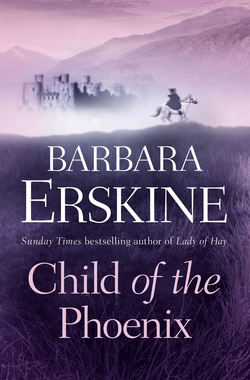Читать книгу Child of the Phoenix - Barbara Erskine - Страница 13
V
ОглавлениеHorses had been part of Eleyne’s life ever since she could remember, and Rhonwen, who in all other matters was strict and even overprotective, never interfered unduly with her when she was in the stables. Horses adored the child; they trusted her; the stout Welsh ponies at her father’s court, the finer palfreys, the great warhorses, let her climb all over them.
‘Let her be.’ Einion Gweledydd had watched her from a distance and nodded his approval. ‘She has the hand of Epona. The animals sense it. They will never hurt her.’
The old man, one of the most revered bards at Llywelyn’s court, was one of those few survivors who, though he paid grudging lip service to the Christian church, in secret embraced the ancient beliefs which existed still in pockets in the mountains and forests of Britain. As a child Rhonwen had been taken to him by her fey, aristocratic mother and given to the great goddess. The rest of the family had disowned mother and child when they found out and later the heartbroken mother had died. Rhonwen was brought up by Llywelyn’s beautiful lady, Tangwystl, his eldest son Gruffydd’s mother. But Rhonwen had always remembered her destiny and remained faithful to her goddess – and obedient to Einion.
It was Einion who secretly supervised Eleyne’s education, although he never went near her himself. Ostensibly it was Rhonwen who taught her everything she knew. How to read and write in Welsh and French and English; how to count; how to sew and weave and how to sing and play the harp; and it was Rhonwen who told her the stories of her father’s principality, of the ancient kingdoms of Wales and the old gods and heroes who walked their mountains and forests. The child was bright and eager and learned quickly. Her father and Einion were both satisfied.
Princess Joan, Llywelyn’s wife, who had in many eyes usurped the position of Tangwystl, and whose son Dafydd was destined to take Gruffydd’s place as his father’s heir, showed no interest in Eleyne, her youngest child. The rest of her brood were grown; her maternal feelings had been exhausted by them. It was left to Llywelyn to show Eleyne parental affection and this he did often. He adored her. The fact that he had married her as a two-year-old baby to the heir of his powerful neighbour, the Earl of Chester, a young man who was also heir presumptive to the King of Scots, was almost forgotten. She would not go to her husband until she was fourteen. Until then she was his daughter and his delight.
Both the Prince of Aberffraw and Eleyne’s distant husband were happy to leave the child in Rhonwen’s care. She was competent and she was dedicated. Joan had been less happy with the choice of Rhonwen when she found out the young woman’s background, but she was quiet and she was dutiful and Joan had better things to think about. After a while she put her objections to Rhonwen out of her mind, although she never bothered to hide her dislike. Had she known Rhonwen’s feelings towards her and the nurse’s passionate attachment to Tangwystl’s son and the native Welsh cause, she would have been far more concerned. As both she and her husband would have been had they known that Rhonwen was still a follower of the ancient faith and that she and Einion Gweledydd had marked Eleyne for their own.
